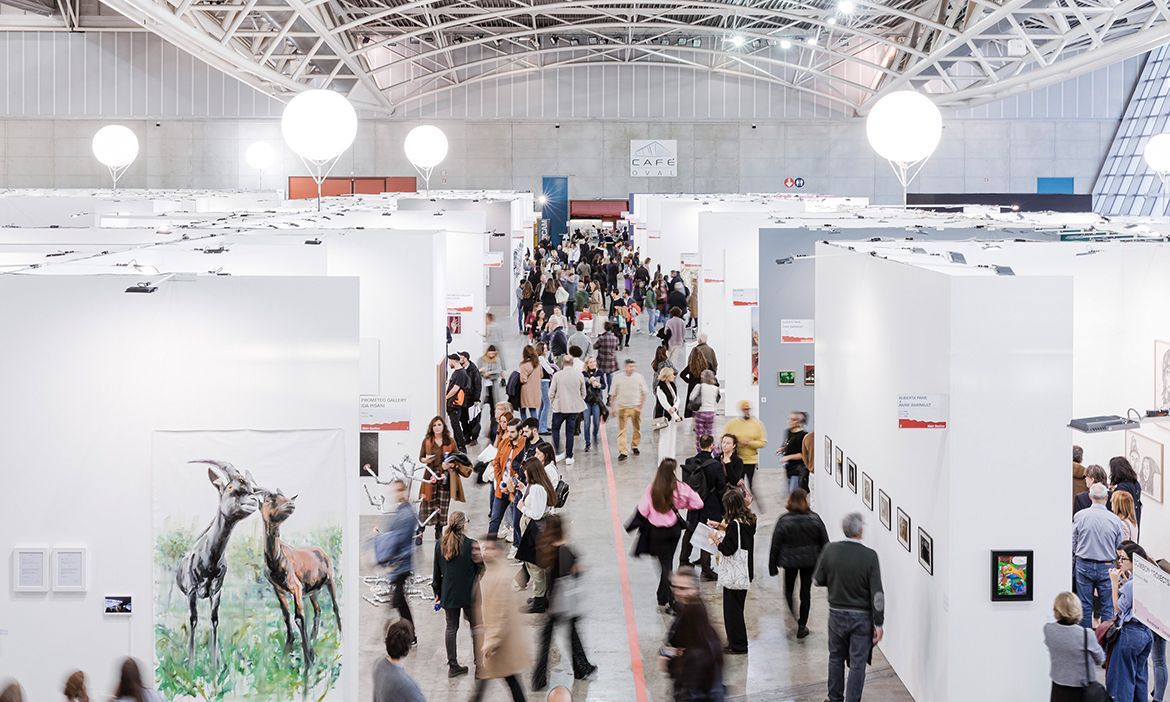The Artissima fair, at the Oval Lingotto in Turin, features 181 galleries from 33 countries this year, including 39 newcomers mostly from outside Italy
Edoardo Piva
Artissima, Italy’s leading contemporary art fair, has often looked to the future and sometimes even anticipated it, both by identifying emerging trends, artists and galleries, and by foreshadowing developments of the art fair model. In 2007, when Andrea Bellini succeeded the fair’s founder, Roberto Casiraghi, Artissima became the first contemporary art fair to employ a director from the curatorial world—a now increasingly common practice. The fair’s current director, Luigi Fassi, who was appointed in 2022, heads up Artissima’s landmark 30th edition this month, which will see 181 galleries (58% foreign) from 33 countries exhibit at the Oval Lingotto arena on the outskirts of Turin. Longstanding participants include Jocelyn Wolff, from Paris, and Lia Rumma, from Milan. They will join 39 newcomers, including Good Weather (Little Rock, Chicago), Cristina Guerra (Lisbon), Meyer*Kainer (Vienna), Raster (Warsaw), The Sunday Painter (London) and Unit 17 (Vancouver).
The Art Newspaper: Each edition of Artissima typically has a theme. But why give a theme to an event whose primary objective is commercial?
Luigi Fassi:This year’s theme is “Relations of Care” and comes from a 2022 text by Renzo Taddei—one of the most authoritative contemporary anthropologists in Latin America and beyond. Establishing “relations of care” is what Artissima has done for almost 30 years, within several art professional communities in Turin: the gallery owners, artists of course, curators, journalists, museum directors and also the collectors and aficionados who have now, through several generations from 1994 to 2023, developed their passions into vocations. All of them have made the city’s interest in art evolve in an increasingly sophisticated way.
The theme of this year’s Artissima, which is directed by Luigi Fassi, is “Relations of Care”
Alessandro Peirone
This year, the historic section, Back to the Future, looks to the 1950s but focuses only on female artists.
Back to the Future is jointly curated by Francesco Manacorda (the newly appointed director of the Castello di Rivoli contemporary art museum in Turin)—who was the director of Artissima in2010 and 2011, and who founded the this section—and Defne Ayas, a curator of Turkish origin, based in Berlin. They are focusing their attention on geographical areas that are, above all, far removed from traditional Modernism or Western Modernisms, such as the Middle East and North Africa. Manacorda and Ayas are identifying female artists who developed extremely innovative work, which has directly influenced future generations of artists in those countries. It is a section that this year, as it has been in the past, strongly demonstrates the ability of the fair to engage institutions and exhibition curators—it is a section that we could imagine being able to catapult straight into a museum.
Why do you often call Artissima an “accelerator”?
Artissima is first and foremost a market fair that has nevertheless become an institution due to its ability to create content, i.e. ideas and projectsbuilt directly with the artists. This term “accelerator” comes from the fair’s ability to respond to many needs, those of the collector who wishes to discover unknown galleries and artists, the curators and museum directors who need stimuli to compose the exhibition calendar of their institution. For this reason we have 39 galleries taking part in Artissima for the first time, most of them non-Italian. Last year there were 40. This produces novelty and continued attraction. I like to think of Artissima as an art world start-up for these types of galleries.
Artissima’s satellite shows outside the Oval Lingotto often cause concern among gallerists, who fear their customers will be distracted by the amount of things to see away from their stands.
It is essential for the fair to expand itself inside the Oval as well as outside the Oval, through thinking with the artists and the galleries. The exhibition The Human Condition by the Italo-Brazilian curator Jacopo Crivelli Visconti, at the Gallerie d’Italia, is dedicated to works by artists represented by the Artissima galleries, providing an extra opportunity for the artists and the dealers themselves.
We could give other examples in this sense. But everything is designed not to create distraction, but rather to deepen what is seen at the Oval.
• Artissima, Oval Lingotto, Turin, 3-5 November

